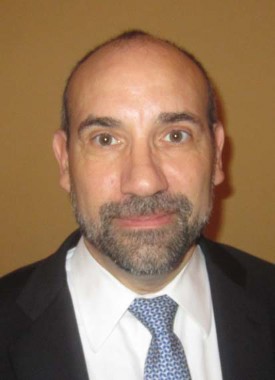User login
LAS VEGAS – Transplant surgeons need help from the mental health community to ensure that patients who undergo hand, face, foot, and other non-solid organ transplants succeed psychiatrically, a consultant for transplant teams says.
That’s because all of the patients who have failed those procedures have done so because of psychiatric issues, according to Dr. José R. Maldonado, the psychiatric consultant for six transplant teams at Stanford (Calif.) University. "If you get a new liver, you wake up in the morning, you have a scar in the middle of your belly, that’s it," he said. "You have pain, but you had pain before the transplant."
But getting a new hand, for example, affects patients differently.
"When you wake up in the morning and look down, you see a stitched hand attached to your body," said Dr. Maldonado, an associate professor of psychiatry and behavioral sciences at the university. "You know that that is not a part of you."
This is the same kind of mental processing that patients must undergo when they get a new face, ear, or other body part. "People have a very hard time accepting that. Those are the patients who have the most significant difficulty adapting to" a transplant, he said.
Some patients stop taking their antirejection drugs and coming to follow-up visits. Others "have gone back to the medical center and requested or demanded that they take the hand off. Some of them have taken a machete and just cut their own hand off," Dr. Maldonado told an audience of psychiatrists and other mental health professionals at the annual psychopharmacology update held by the Nevada Psychiatric Association.
The issue is of particular concern at Stanford, because the university is establishing its own non-solid organ transplant program, which will join a handful of others across the United States.
Psychiatric problems are not unique to face and hand transplants; mental health issues also bedevil organ transplant patients both before and after the procedure. The worse those problems are, the worse patients tend to do. Depression and anxiety are common, as is guilt about benefiting from the donor’s death. When patients realize that their recovery is going to be difficult and slow, they become demoralized.
Heart and lung transplants seem to be the hardest on patients; some develop post-traumatic stress disorder. Liver and kidney transplants take less of a mental toll.
Immunosuppressives have their own psychiatric side effects, which complicate matters, and nearly all psychiatric medications – antidepressants, neuroleptics, benzodiazepines, and the rest – interfere with their action.
Transplants can be hard on psychiatrists, too, especially when transplant teams call to ask whether patients are good candidates for scarce organs. Given the assumed implications, it can be hard to say no.
But doing so isn’t necessarily a death sentence, Dr. Maldonado said.
He and his team have developed a pretransplant questionnaire called the SIPAT (Stanford Integrated Psychosocial Assessment for Transplant) to identify good candidates and the weaknesses that make people poor candidates so they can work on them. It’s available free online.
The 18 questions focus on four areas known to affect transplant outcomes: psychosocial support, substance abuse, mental health, and the way in which patients understand and manage their illnesses.
With the feedback, it is possible to design a treatment plan that will make these patients better transplant candidates or refer them to others who can help. That way, when these patients are seen by transplant teams, they have a better chance of being accepted, he said.
Even after rejection, the door isn’t closed forever. "Telling somebody, ‘You don’t make the cut, and unless you make a dramatic change in your life, you will never make the cut’ [will motivate some to] fix their life, come back in 6 months, and say, ‘Doctor, I’m ready. Let’s do it.’ You repeat the [assessment]," and they are now acceptable candidates, he said.
Dr. Maldonado said he had no disclosures.
LAS VEGAS – Transplant surgeons need help from the mental health community to ensure that patients who undergo hand, face, foot, and other non-solid organ transplants succeed psychiatrically, a consultant for transplant teams says.
That’s because all of the patients who have failed those procedures have done so because of psychiatric issues, according to Dr. José R. Maldonado, the psychiatric consultant for six transplant teams at Stanford (Calif.) University. "If you get a new liver, you wake up in the morning, you have a scar in the middle of your belly, that’s it," he said. "You have pain, but you had pain before the transplant."
But getting a new hand, for example, affects patients differently.
"When you wake up in the morning and look down, you see a stitched hand attached to your body," said Dr. Maldonado, an associate professor of psychiatry and behavioral sciences at the university. "You know that that is not a part of you."
This is the same kind of mental processing that patients must undergo when they get a new face, ear, or other body part. "People have a very hard time accepting that. Those are the patients who have the most significant difficulty adapting to" a transplant, he said.
Some patients stop taking their antirejection drugs and coming to follow-up visits. Others "have gone back to the medical center and requested or demanded that they take the hand off. Some of them have taken a machete and just cut their own hand off," Dr. Maldonado told an audience of psychiatrists and other mental health professionals at the annual psychopharmacology update held by the Nevada Psychiatric Association.
The issue is of particular concern at Stanford, because the university is establishing its own non-solid organ transplant program, which will join a handful of others across the United States.
Psychiatric problems are not unique to face and hand transplants; mental health issues also bedevil organ transplant patients both before and after the procedure. The worse those problems are, the worse patients tend to do. Depression and anxiety are common, as is guilt about benefiting from the donor’s death. When patients realize that their recovery is going to be difficult and slow, they become demoralized.
Heart and lung transplants seem to be the hardest on patients; some develop post-traumatic stress disorder. Liver and kidney transplants take less of a mental toll.
Immunosuppressives have their own psychiatric side effects, which complicate matters, and nearly all psychiatric medications – antidepressants, neuroleptics, benzodiazepines, and the rest – interfere with their action.
Transplants can be hard on psychiatrists, too, especially when transplant teams call to ask whether patients are good candidates for scarce organs. Given the assumed implications, it can be hard to say no.
But doing so isn’t necessarily a death sentence, Dr. Maldonado said.
He and his team have developed a pretransplant questionnaire called the SIPAT (Stanford Integrated Psychosocial Assessment for Transplant) to identify good candidates and the weaknesses that make people poor candidates so they can work on them. It’s available free online.
The 18 questions focus on four areas known to affect transplant outcomes: psychosocial support, substance abuse, mental health, and the way in which patients understand and manage their illnesses.
With the feedback, it is possible to design a treatment plan that will make these patients better transplant candidates or refer them to others who can help. That way, when these patients are seen by transplant teams, they have a better chance of being accepted, he said.
Even after rejection, the door isn’t closed forever. "Telling somebody, ‘You don’t make the cut, and unless you make a dramatic change in your life, you will never make the cut’ [will motivate some to] fix their life, come back in 6 months, and say, ‘Doctor, I’m ready. Let’s do it.’ You repeat the [assessment]," and they are now acceptable candidates, he said.
Dr. Maldonado said he had no disclosures.
LAS VEGAS – Transplant surgeons need help from the mental health community to ensure that patients who undergo hand, face, foot, and other non-solid organ transplants succeed psychiatrically, a consultant for transplant teams says.
That’s because all of the patients who have failed those procedures have done so because of psychiatric issues, according to Dr. José R. Maldonado, the psychiatric consultant for six transplant teams at Stanford (Calif.) University. "If you get a new liver, you wake up in the morning, you have a scar in the middle of your belly, that’s it," he said. "You have pain, but you had pain before the transplant."
But getting a new hand, for example, affects patients differently.
"When you wake up in the morning and look down, you see a stitched hand attached to your body," said Dr. Maldonado, an associate professor of psychiatry and behavioral sciences at the university. "You know that that is not a part of you."
This is the same kind of mental processing that patients must undergo when they get a new face, ear, or other body part. "People have a very hard time accepting that. Those are the patients who have the most significant difficulty adapting to" a transplant, he said.
Some patients stop taking their antirejection drugs and coming to follow-up visits. Others "have gone back to the medical center and requested or demanded that they take the hand off. Some of them have taken a machete and just cut their own hand off," Dr. Maldonado told an audience of psychiatrists and other mental health professionals at the annual psychopharmacology update held by the Nevada Psychiatric Association.
The issue is of particular concern at Stanford, because the university is establishing its own non-solid organ transplant program, which will join a handful of others across the United States.
Psychiatric problems are not unique to face and hand transplants; mental health issues also bedevil organ transplant patients both before and after the procedure. The worse those problems are, the worse patients tend to do. Depression and anxiety are common, as is guilt about benefiting from the donor’s death. When patients realize that their recovery is going to be difficult and slow, they become demoralized.
Heart and lung transplants seem to be the hardest on patients; some develop post-traumatic stress disorder. Liver and kidney transplants take less of a mental toll.
Immunosuppressives have their own psychiatric side effects, which complicate matters, and nearly all psychiatric medications – antidepressants, neuroleptics, benzodiazepines, and the rest – interfere with their action.
Transplants can be hard on psychiatrists, too, especially when transplant teams call to ask whether patients are good candidates for scarce organs. Given the assumed implications, it can be hard to say no.
But doing so isn’t necessarily a death sentence, Dr. Maldonado said.
He and his team have developed a pretransplant questionnaire called the SIPAT (Stanford Integrated Psychosocial Assessment for Transplant) to identify good candidates and the weaknesses that make people poor candidates so they can work on them. It’s available free online.
The 18 questions focus on four areas known to affect transplant outcomes: psychosocial support, substance abuse, mental health, and the way in which patients understand and manage their illnesses.
With the feedback, it is possible to design a treatment plan that will make these patients better transplant candidates or refer them to others who can help. That way, when these patients are seen by transplant teams, they have a better chance of being accepted, he said.
Even after rejection, the door isn’t closed forever. "Telling somebody, ‘You don’t make the cut, and unless you make a dramatic change in your life, you will never make the cut’ [will motivate some to] fix their life, come back in 6 months, and say, ‘Doctor, I’m ready. Let’s do it.’ You repeat the [assessment]," and they are now acceptable candidates, he said.
Dr. Maldonado said he had no disclosures.
EXPERT ANALYSIS FROM THE NPA ANNUAL PSYCHOPHARMACOLOGY UPDATE

